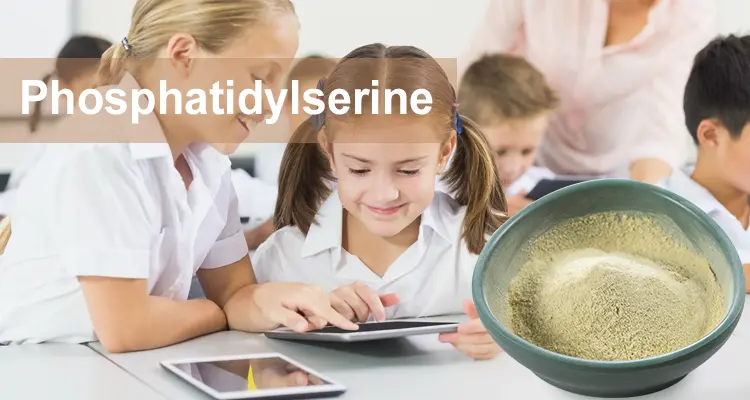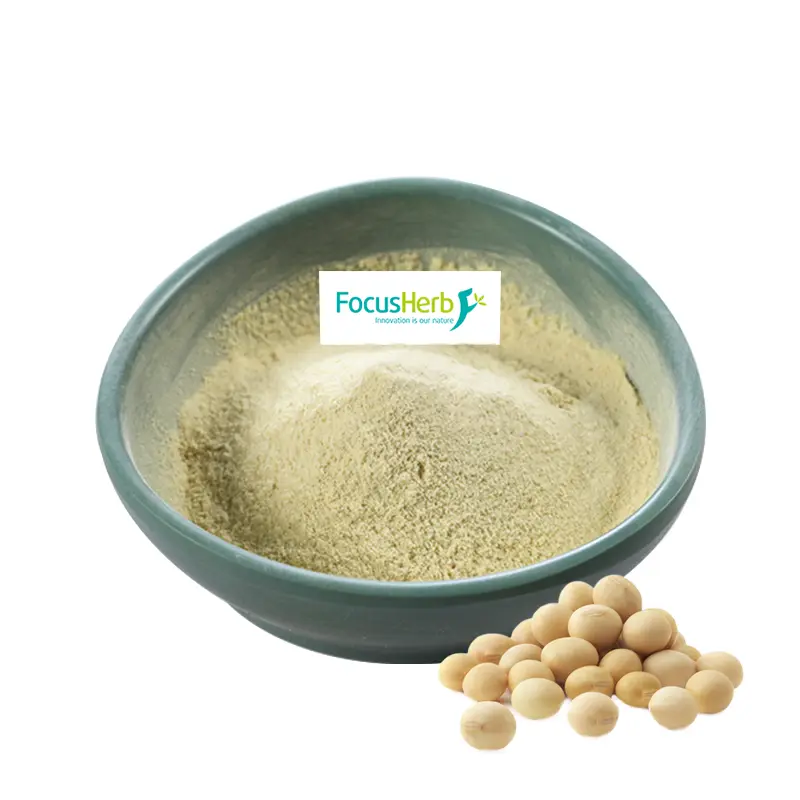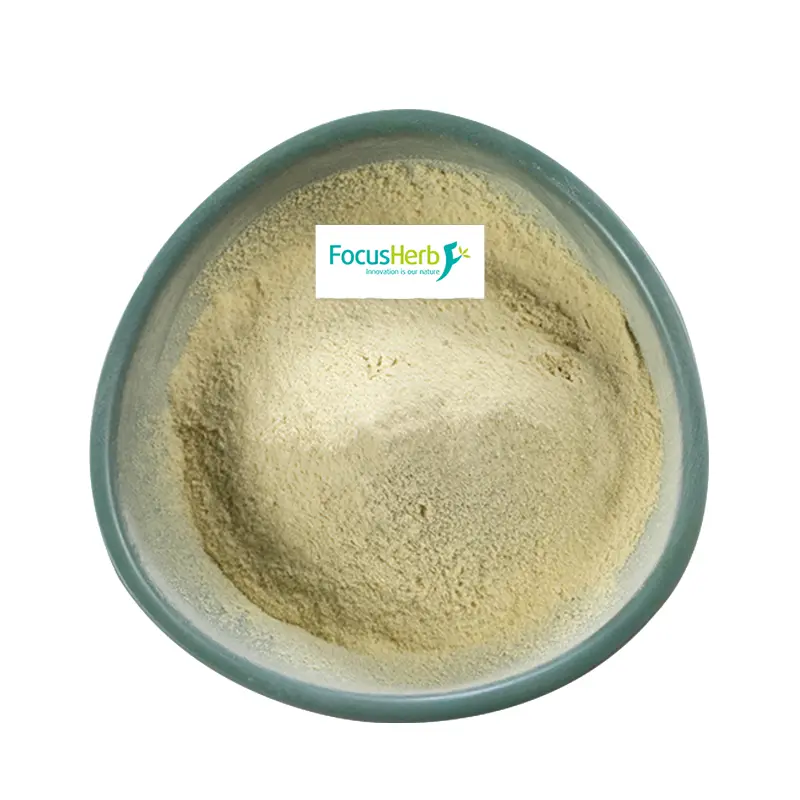Phosphatidylserine, known as the “brain nutrient,” is essential for efficient brain function. Among these, phosphatidylserine holds a unique and crucial role, closely linked to cognitive function and memory. Like a mysterious key, it seems to unlock the door to the brain’s potential, improve cognitive function and memory, and infuse our spiritual world with vitality and brilliance.
What is Phosphatidylserine?
Phosphatidylserine (PS) is a naturally occurring phospholipid, like the delicate bricks that build the edifice of life, playing an indispensable role in the microscopic world of cells. Composed of a clever combination of glycerol, fatty acids, phosphoric acid, and serine, its unique molecular structure endows phosphatidylserine with remarkable chemical properties. Like an amphibious messenger, it possesses both hydrophilic and lipophilic properties, enabling it to move freely between the water and lipid environments of cells, fulfilling its vital physiological functions. Phosphatidylserine is widely distributed throughout the vast “universe of life” of the human body, particularly in high concentrations within the brain, the mysterious “temple of wisdom.” It is a key active substance in brain cell membranes, accounting for approximately 2%-10% of the brain’s total phospholipid content. Phosphatidylserine is found busily working in various brain regions, from the hippocampus, responsible for memory storage, to the frontal lobe, responsible for logical thinking, to the cerebellum, responsible for coordinating body movement. Like a loyal guardian, it silently safeguards the structural integrity and proper function of brain cells.
Phosphatidylserine comes from a variety of sources. Naturally, some foods are like hidden treasures, containing phosphatidylserine. For example, seeds like soybeans and peanuts cleverly incorporate phosphatidylserine into their composition during growth. Deep-sea fish like salmon also contain a certain amount of phosphatidylserine. These marine organisms accumulate this precious nutrient in their unique marine ecosystem. In addition, advances in modern technology enable us to obtain phosphatidylserine through chemical synthesis to meet the growing research and application needs.
How Phosphatidylserine Improves Cognition and Memory
(I) A “Repairer” of Neuronal Cell Membranes
Neurons in the brain are like delicate little machines, and their cell membranes are the vital “shells” that ensure their normal operation. As a key component of the neuronal cell membrane, phosphatidylserine plays a crucial role in maintaining its structure and function. It acts like a “lubricant” for the cell membrane, enhancing its fluidity and making it more flexible, enabling better material exchange and signal transmission. With aging or under certain pathological conditions, the neuronal cell membrane gradually loses its fluidity and becomes rigid, like aging machine parts that no longer operate smoothly. This leads to impaired neuronal function and decreased cognitive ability. Phosphatidylserine can slow this neuronal degeneration process, repair cell membrane damage promptly, and keep neurons youthful and vibrant, thus providing a solid structural foundation for the brain’s cognitive functions.
(II) A “Booster” for Neurotransmitters
Neurotransmitters are the brain’s “information couriers,” transmitting signals between neurons and enabling complex brain activities such as learning, memory, and thinking. Phosphatidylserine plays a crucial role as a “booster” in this process, promoting the synthesis and release of neurotransmitters such as acetylcholine. Take acetylcholine, for example, which plays a key role in memory and cognition and is a crucial player in learning and memory formation. When we learn new information, the brain requires large quantities of acetylcholine to help establish new connections between neurons and form memory traces. By increasing the synthesis and release of acetylcholine, phosphatidylserine acts like a “transportation vehicle” for this “message couriers,” speeding up the transmission of neural signals and enabling the brain to process information more efficiently. This improves our memory and cognitive abilities, making it easier to retain new information and more agile in our thinking.
(III) An “Optimizer” of Brain Energy Metabolism
The brain is a major energy consumer in the human body, consuming approximately 20% of our energy even at rest. The brain’s energy primarily comes from the oxidative metabolism of glucose, and mitochondria, the “energy factories” within the cells, are responsible for converting glucose into the energy molecule ATP (adenosine triphosphate). Phosphatidylserine acts like a “high-quality manager” for mitochondria, enhancing their function and promoting efficient glucose utilization. When phosphatidylserine is abundant, mitochondria can function more efficiently, fully converting glucose into ATP, providing ample energy for the brain. This is like providing a stable and powerful power source for the brain’s “supercomputer,” ensuring it doesn’t freeze or stall due to energy shortages when performing complex cognitive tasks. This maintains normal cognitive function and allows us to think more clearly and agilely.
(IV) Antioxidant “Shield”
In our daily lives, the brain is attacked by various free radicals. These free radicals act like “little bombs,” causing oxidative damage to brain cells, disrupting their structure and function, and thus impairing cognitive function. Phosphatidylserine acts like a sturdy “shield,” possessing powerful antioxidant properties that neutralize these free radicals and reduce their damage to brain cells. It can enhance the brain’s own antioxidant defense capabilities by activating the antioxidant enzyme system in cells, such as superoxide dismutase (SOD) and glutathione peroxidase (GSH-Px). At the same time, phosphatidylserine can directly bind to free radicals and inactivate them, thereby protecting brain cells from oxidative stress damage, maintaining normal brain function, and allowing our cognitive abilities to remain stable over the years.
Strong Scientific Validation
A wealth of rigorous and in-depth scientific research, like a beacon of light, illuminates the path forward for the miraculous effects of phosphatidylserine on improving cognitive function and memory, providing solid and reliable evidence. Numerous studies conducted on diverse populations have revealed the positive impact of phosphatidylserine on brain health from various perspectives and levels, providing a more comprehensive and in-depth understanding of this miraculous substance.
In studies targeting older adults, phosphatidylserine has demonstrated its potent ability to combat cognitive decline. In one study involving a large group of individuals aged 65 and over, one group received a daily 300 mg phosphatidylserine supplement, while the other group received a placebo. Over the course of 12 weeks, researchers closely monitored and meticulously recorded the performance of both groups on cognitive tests. The results were encouraging: the group receiving the phosphatidylserine supplement significantly outperformed the placebo group on several key cognitive measures, including memory, attention, and executive function. They performed better at recalling past experiences, retaining new information, and handling complex tasks, as if their brains had been rejuvenated and their memory had returned to its peak years earlier.
Phosphatidylserine also produced surprising changes for students. A unique study involved 120 high school seniors from Chongqing Bashu Middle School. The students were randomly divided into an intervention group and a control group. The intervention group consumed 250 ml of milk fortified with 100 mg of phosphatidylserine daily for 40 days, while the control group consumed regular milk. Before and after the study, the researchers conducted a comprehensive and detailed assessment of the students’ memory using the standard Clinical Memory Scale, covering multiple areas, including directed memory, associative learning, free recall of images, recognition of meaningless figures, and recall of associated features of figures. The experimental results clearly demonstrated that the intervention group showed significant improvements in scores on all scales and total scores compared to pre-experimentation, with significant improvements and enhancements in both verbal and non-verbal memory abilities. Furthermore, the intervention group also showed significant advantages in scores on all scales and total scores compared to the control group, with the differences reaching statistical significance. This study strongly demonstrates that phosphatidylserine can effectively improve students’ memory and help them progress more easily in their studies.
The positive effects of phosphatidylserine have also been fully validated in college students. A double-blind, placebo-controlled study focused on college students. One group received 300 mg of phosphatidylserine daily for 30 days, while the other group received a placebo. In subsequent math tests, the students who received the phosphatidylserine supplement demonstrated faster reaction times, greater confidence, and superior performance. Their test scores also significantly improved. They were able to more quickly and accurately identify solutions to complex math problems, achieving better scores than before.
Daily Use and Supplementation
Diet is an important way to obtain phosphatidylserine in daily life. Many foods naturally contain phosphatidylserine, making it a convenient source of this nutrient.
Meat is a high-quality source of phosphatidylserine, with red meats such as beef and lamb being particularly rich. For example, every 100 grams of beef contains approximately 10-20 mg of phosphatidylserine. These meats are not only delicious on the table but also provide excellent nutritional support for the brain. The yolks of eggs, such as chicken and duck eggs, also contain phosphatidylserine. An average-sized egg yolk contains approximately 5-10 mg of phosphatidylserine. Fish, especially deep-sea fish like salmon and cod, are also rich in phosphatidylserine, with levels reaching 15-25 mg per 100 grams. These bounties from the ocean not only provide a delicious taste but also strongly support brain health. Furthermore, dairy products like milk and yogurt, as well as some vegetables and fruits like spinach, cabbage, and citrus fruits, also contain a certain amount of phosphatidylserine. Although the amounts are relatively low, a diverse diet can still help replenish this important nutrient.
For those who cannot get enough phosphatidylserine from their daily diet due to dietary imbalances, special physiological stages (such as the elderly, students, and pregnant women, who have higher brain nutritional needs), or other reasons, nutritional supplements are a good option. A wide variety of phosphatidylserine supplements are available on the market, with softgels, tablets, and powders being common. When purchasing, prioritize purchasing through reputable channels to ensure product quality and safety. Also, pay attention to the product’s ingredient list and nutrition label to understand the phosphatidylserine content and other added ingredients.
Regarding supplemental dosage, the general recommendation for adults is 100-300 mg of phosphatidylserine per day. For older adults or those showing significant signs of cognitive decline, the dosage can be increased under the guidance of a doctor or professional nutritionist, but should not exceed 600 mg per day. Children’s nervous systems are still developing, and their needs and tolerance for phosphatidylserine differ from those of adults. Therefore, when supplementing with phosphatidylserine for children, it is important to strictly follow the advice of a doctor or nutritionist and determine the appropriate dosage based on individual differences such as age and weight. Avoid blindly following trends to avoid adverse effects on the child’s health. Also, when supplementing with phosphatidylserine, pay close attention to your body’s reactions. If adverse reactions such as gastrointestinal discomfort or allergies occur, discontinue use immediately and consult a professional.
Prospects and Outlook
With increasing interest in brain health, the research prospects for phosphatidylserine in improving cognition and memory are promising, and its potential applications are enormous.
Future research will further explore the molecular and cellular mechanisms of phosphatidylserine, striving to more precisely reveal how it regulates neurotransmitters, influences neuronal growth and survival, and participates in key processes such as neuroplasticity. This will provide a solid theoretical foundation for the development of more effective brain health interventions. Furthermore, more targeted research will be conducted for different populations, such as those with neurodegenerative diseases (such as Alzheimer’s and Parkinson’s), those with mild cognitive impairment, children and adolescents at different stages of brain development, and adults experiencing cognitive fatigue due to work-related stress. This will clarify the optimal dosage, duration of treatment, and safety profile of phosphatidylserine in different situations, thereby enabling personalized and precise supplementation.
In terms of application prospects, the use of phosphatidylserine in health supplements and functional foods will continue to expand. In addition to existing product forms such as supplements and fortified milk, more innovative foods rich in phosphatidylserine may emerge in the future, such as energy bars, nut snacks, and ready-to-drink beverages, meeting consumers’ needs for convenient supplementation in various scenarios. In the medical field, with in-depth research, phosphatidylserine may become a key component of comprehensive treatment plans for neurodegenerative diseases. Combined with medication and rehabilitation training, it can provide patients with better therapeutic outcomes, slow disease progression, and improve quality of life.
Furthermore, with continuous technological advancements, phosphatidylserine production technology will continue to innovate, reducing production costs, improving product quality and bioavailability, and enabling its wider application in various fields, allowing more people to benefit from this miraculous “brain nutrient.” It is believed that in the near future, phosphatidylserine will play an even greater role in protecting brain health, improving cognitive function and memory, and adding new brilliance to human health and well-being.























